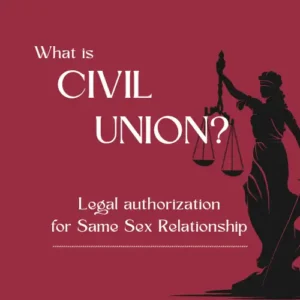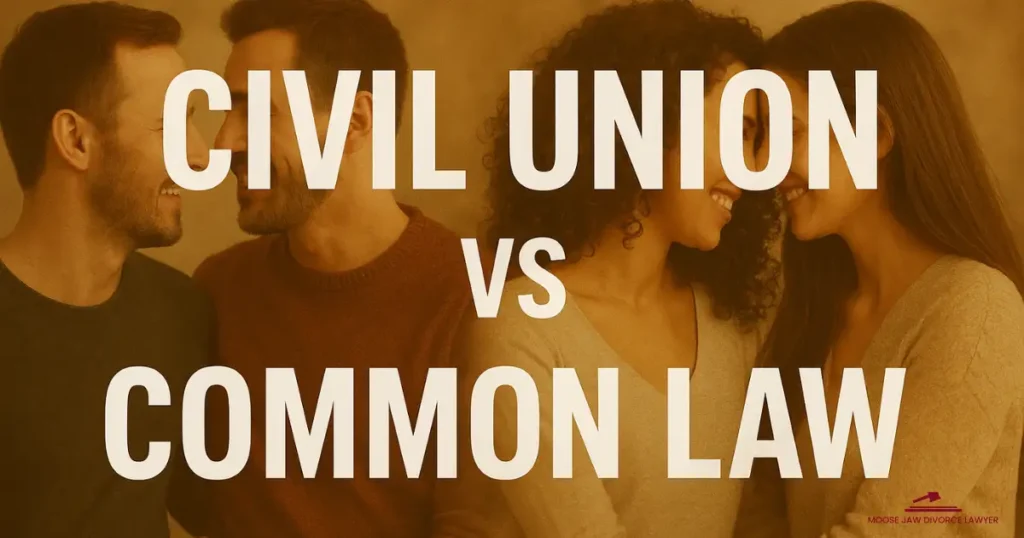The definition of a relationship between a couple has apparently changed over the last decades. The traditional concept of marriage still remains as the primary practice, branching into a few additional categories based on the genders and faiths of the partners and the legal scopes they choose to live in.
Civil Union vs Common Law are two of such varied categories with a redefined perspective. They address the increasing demand among people for a more flexible and independent living style without being targeted as a societal anomaly and raising controversy.
Canada has legalized both Civil Unions and Common-Law, and is currently serving couples acting under relevant Judicial Acts with the due rights and conveniences.
This article will lay an in-depth discussion on:
- What is a Civil Union in Canada?
- What is the Common Law in Canada?
- What is the legal ground for these two relationship types?
- How do they differ in respect of legal scope?
Let’s dive in:
What Is a Civil Union Spouse in Canada?
A Civil Union is a legalized marriage-like status where two people of the same sex get permission to live together.

First introduced in Quebec in 2002, the Civil Code permitting Civil Union was accepted nationwide in Canada with the enactment of the Civil Marriage Act in 2005. While for Quebec citizens, a Civil Union is equivalent to traditional marriage, allowing the spouses the same allowances and benefits. In other provinces, the size of the allowance and procedures vary based on provincial code.
What Is a Common Law Relationship in Canada?
A Common-Law marriage happens when a couple (of the opposite sex) chooses to live together without a marriage and spend at least 12 months or share a child. The establishment of the Common Law Act in Canada dates back to 18th 18th-century colonial period, and the Act is still active with a few added and modified sections.
Spouses tied in under this act are not recognized as married, but they enjoy and bear TAX and other financial benefits and liabilities together. Like the Civil Union, they have to follow separate regulations province-wise.

Legal Ground for Civil Union and Common-Law Relationships
Both Civil Union and Common-law are specialized forms that deviate from the mainstream idea of marriage.
Civil Union: Regulations, Benefits & Liabilities
With the Civil Marriage Act, the Government of Canada started to view marriage as a cohabitation system for two persons, instead of for two members of opposite genders.
Regulations that guide this relationship are:
- Couples must be over 18
- Must be unmarried
- Mustn’t be engaged in another Civil Union
- Must be bonded by mutual consent
- Must register through the Civil Union/Marriage Act
When living as partners, they can appeal for and get:
- Rights for sharing properties, inheritance, and support
- Parallel recognition and responsibilities to marriage
- Spousal support in case of a dissolution
- Authority in financial and medical decisions for the partner
Despite a few odds, they are also meant to carry out liabilities, like:
- Pay out debts and premiums of post-marriage contracts
- Perform obligatory duties for the partner
- Answer to the legal authority for any breach in the Act
Common Law: Regulations, Benefits & Liabilities
The primary purpose behind the Common Law is to remove worries over the serious liabilities associated with traditional marriage. Couples practicing Common Law start their conjugal life early and prepare for the rest together. The responsibilities are there, but the burden of a serious commitment is excluded.
Regulatory boundaries of Common Law:
- Couples must not be married by traditional law
- Recognized after a minimum of 12 years of cohabitation
- Sharing a child together also allows for the recognition
- Can apply for social and immigration benefits
When living as a Common Law partner, you can:
- Get all special government services like a regular married couple
- Get spousal benefits and immigration status
- Share properties and assets and enjoy the same associated rights
- Become subject to all types of community and residential benefits
Like for all other types of couples, benefits come with a few liabilities for Common Law partners:
- Being liable to carry out common liabilities, like taxes, fines, and debts
- Observing parental responsibilities like a normal couple
- Facing jurisdictions, partners may have to answer for each other
- A separation for a specific duration can end a marriage, without a divorce
Civil Union Vs Common Law – Major Differences
All the major differences between Common Law and Civil Law are categorized in the table below:
| Aspect | Civil Union | Common-Law Partnership |
| Legal Nature | A marriage between people of the same gender, different faiths, atheists, or others under the Civil Union/Marriage Act. | A relationship recognized as a normal marriage without a formal binding by duration of cohabitation and childbirth. |
| Legal Recognition | Formal documentation and recognition | Recognition comes after meeting certain obligations
|
| Eligibility Criteria | Must follow two major obligations:
|
There is no boundary to starting a Common Law partnership. |
| Registration Requirement | Mandatory — must register through the Civil Union/Marriage Act. | Not required — Once the obligations are met, recognition follows. A formal application is advised, but not mandatory. |
| Legal Framework | Follows the guidelines of the Civil Marriage Act and Civil Union Act. | The provincial courts and social policy dictate the performance. |
| Dissolution | Similar to the regular divorce procedure | Can end automatically through separation for a specific period — no divorce required. |
| Liabilities | High — includes formal registration, shared liabilities like regular marriage. | Lower — fewer formalities, parental, financial, and legal liabilities |
Apart from these, the laws guiding these relationships also share a couple more special differences:
Areal Coverage
Civil Union is still not well recognized throughout Canada, mainly practiced in Quebec and a few other provinces. Common Law has no such limitations, widely practiced across all provinces.
Child Protection
Civil Union marriage provides full custody, support, rights, and protections to children. Whereas, Common Law partners get only certain protective measures and have limited rights over their children.
Final Words
For partners continuing relationships indescribable by regular practices and laws, Civil Union vs Common Law in Canada raises confusion, mostly because of their unawareness about the Acts associated with their practices and the benefits and responsibilities they are entitled to. In simple words, a Civil Union is a formal marriage, follows customs and regulations close to a regular marriage. But it is special in respect of the partners’ gender, faith, and relationship status. A Common Law partnership gets recognized after a certain period, but doesn’t involve a formal marriage.

